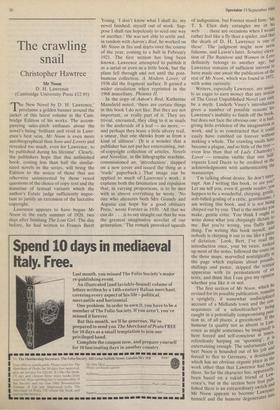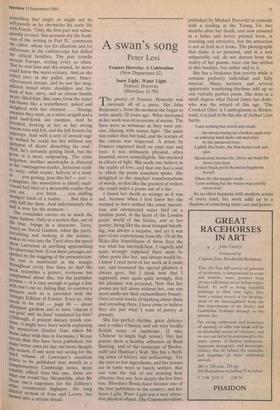The crawling snail
Christopher Hawtree
Mr Noon D. H. Lawrence (Cambridge University Press £12.95) 'The New Novel by D. H. Lawrence,'
proclaims a golden banner around the jacket of this latest volume in the Cam- bridge Edition of his works. The accom- panying sales-pitch enthuses about the novel's being 'brilliant and vivid in Lawr- ence's best vein, Mr Noon is even more autobiographical than Sons and Lovers and revealed too much, even for Lawrence, to be published during his lifetime'. Clearly, the publishers hope that this unfinished book. costing less than half the similar- sized novels in the series, will bring the Edition to the notice of those that are otherwise uninterested by those vexed questions of the choice of copy-text and the minutiae of textual variants which the author's Estate judge sufficiently impor- tant to justify an extension of the lucrative copyright.
Lawrence appears to have begun Mr Noon in the early summer of 1920, two days after finishing The Lost Girl. The day before, he had written to Francis Brett Young, 'I don't know what I shall do, my novel finished, myself out of work. Sup- pose I shall run hopelessly to seed one way or another.' He was not able to settle and, in tandem with Aaron's Rod, he worked on Mr Noon in fits and starts over the course of the year, coming to a halt in February 1921. The first section has long been known. Lawrence attempted to publish it as a serial or even as a little book, but the plans fell through and not until the post- humous collection, A Modern Lover, of 1936 did the fragment surface. It gained a wider circulation when reprinted in the 1968 miscellany, Phoenix II.
In the copy of Aaron's Rod, Katherine Mansfield noted, 'there are certain things in this book I do not like. But they are not important, or really part of it. They are trivial, encrusted, they cling to it as snails to the underside of a leaf — no more, and perhaps they leave a little silvery trail, a smear, that one shrinks from as from a kind of silliness'. (It is a wonder that a publisher has not put her entertaining, out- of-copyright collection of articles, Novels and Novelists, in the lithographic machine, commissioned an, 'introduction', slapped on a new cover and issued the thing as a 'trade' paperback.) That image can be applied to much of Lawrence's work; it explains both the fascination and repulsion that, in varying proportions, is to be met with in almost everything he wrote. 'No one who alienates both Mrs Grundy and Aspatia can hope for a good obituary Press,' wrote Forster in 1930. 'All that we can do . . . is to say straight out that he was the greatest imaginative novelist of our generation.' The remark provoked squeals Spectator 15 September 19M of indignation, but Forster stood firm: 'Mr T. S. Eliot duly entangles me in his web . . . there are occasions when I would rather feel like a fly than a spider, and that the death of D. H. Lawrence is one of these'. The judgment might now seem fulsome, and Leavis's later, Scrutiny eleva- tion of The Rainbow and Women in Love definitely belongs to another age, but Lawrence remains of sufficient interest to have made one await the publication of the rest of Mr Noon, which was found in 1972, with some curiosity. Writers, especially Lawrence, are usual- ly so eager to earn money that any notion of The Great Unpublished Novel can only be a myth. Lindeth Vasey's introduction gives a number of possible reasons for Lawrence's inability to finish off the book, but does not face the obvious one: it is bad, giving little evidence of the imagination at work, and is so constructed that it could easily have rambled on forever without making a whole. The crawling snails have become a plague, and so little of the tree-7- even less than that of Lady Chatterley s Lover — remains visible that one half" expects Lord Dacre to be credited in the acknowledgments with authenticating the manuscript. 'I'm talking about desire. So don't inter; rupt. Am I writing this book, or are you. Let me tell you, even if, gentle reader, Pe happen to be a wonderful, chirping, gentle; soft-billed gosling of a critic, gentilissitnO, am writing this book, and it is not bag chirped out by you. That is the mistake you make, gentle critic. You think I ought to write down what you chirpingly dictate to me. But you're wrong, you fluffy little thing. I'm writing this book myself, and nobody is chirping it out to me like a piece of dictation.' Look, Bert, I've read the, introduction once, your bit twice, looked up most of the notes, followed the route on the three maps, marvelled nostalgicallYds the page which explains about poun: shillings and pence, skipped the textual apparatus with its permutations of 51% texts, and think that I can give my opinion whether you like it or not. The first section of Mr Noon, which he revised for its possible publication, remains sprightly, if somewhat undisciplined- account of a Midlands town and the et). sequences of a schoolteacher's being caught in a potentially compromising poste tion in, of all places, a greenhouse. If th, humour (a quality not as absent in Law rence as might sometimes be imagined) is here forced and self-conscious at D.M es! relentlessly harping on 'spooning', entertaining enough. The unfortunate bert Noon is hounded out of his job 8,0".. forced to flee to Germany, a destinan°4 which has no obvious organic place in " betu., work other than that Lawrence had ? there. So far the character has, apParellt13:.: been based on a rakish friend of Law._ rence's, but in the section here first puo, lished there is an extraordinary switch an Mr Noon app i ears to become Lawrence ,0 himself and the humour degenerates n' something that might or might not be self-parody as he chronicles his early life with Frieda. 'Only the first part was subse- quently revised: this accounts for the fresh- ness of the writing in Part II,' comments the editor, whose eye for allusions and for differences in the carbon-copy has dulled the critical faculties. The pair trundle around Europe, resting every so often. But he was lean and dry-souled, he never could know the water-ecstacy. And as she rolled over in the pallid, pure, bluey- effervescent stream, and he saw her mag- nificent broad white shoulders and her knot of hair, envy, and an almost hostile desire filled him. She came from the water full-blown like a waterflower, naked and delighted with her element . . . Strange enemies they were, as a white seagull and a gold land-hawk are enemies. And he brooded, looking at her as her strong bosom rose and fell, and the full breasts lay sideways. And with a sort of inward rage he Wished he could see her without any darkness of desire disturbing his soul.' Well, he's certainly getting fresh, but the Prose is a mere outpouring. The critic forgotten, another apostrophe is directed at the 'rampageous reader, ferocious read- er, surly, rabid reader, hell-cat of a read- er • . you girning, [can this be? — yes! a misprint; the annotation is silent] snarl-
voiced hell-bird of a detestable reader that you are . . . you bitch . . . you sniffing mongrel bitch of a reader . . . But that is Only half the show. And unfortunately this half is over for the moment.'
The remainder carries on in much the same fashion. Only in a section that, out of
the blue, brings in a character, Terry,
based on David Garnett, when the party, botanising and looking at the scenery,
makes its way into the Tyrol does the novel show Lawrence at anything approaching his observant best. Even these passages are spoiled by the nagging of the presentation:
the text is numbered in the margin throughout every five lines so that the
book resembles a primer; everyone has
Complained about this, but the publisher Persists — it is easy enough to gauge a line
With one's eye or, failing that, to contrive a measure such as is provided with the Abinger Edition of Forster. Even so, who needs to be told — page 68 — about
allotment gardens and to have 'chacun son , goat' and 'au fond' translated for him? (Although, if present dietary trends con- tinue, it might have been worth explaining mysterious Quaker Oats which Mr Noon takes with him to Germany.) Worse novels than this have been published, but has better ones are due out more cheaply ! season; if one were not saving for the third volume of Lawrence's excellent letters to be published next month in a complementary Cambridge series, more sensibly edited than this one, those are what one would buy. Meanwhile, after Mr Noon one's eagerness for the Edition's other commercial highspot, the long deleted section of Sons and Lovers, has Mrned into a certain dread.



















































 Previous page
Previous page